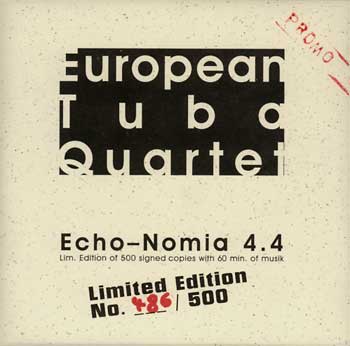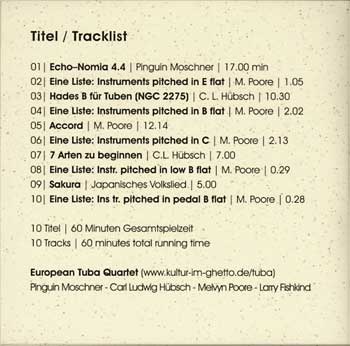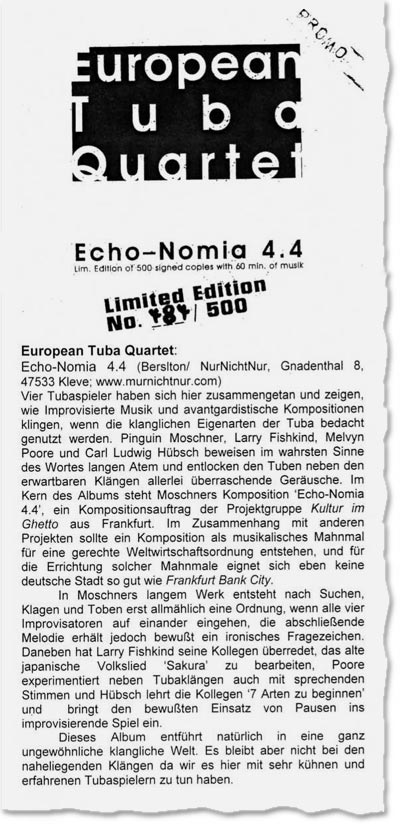
European Tuba Quartet
Echo-Nomia 4.4
Limited Edition of 500 signed copies with 60 min. of music.

Amsterdam resident, but American-born, Larry Fishkind is one quarter of the ETQ. As someone who has worked with the
ICP, theatre, and philharmonic orchestras plus a Klezmer band with pianist Burton Greene, Fishkind’s skills in
jazz and improv are unparalleled. Another ETQ member, German tubaist Pinguin Moschner, is part of a duo with guitarist
Joe Sachse that plays the music of Jimi Hendrix, and has also been in ensembles put together by American composer-instrumentalists
Butch Morris, Anthony Braxton, and Roscoe Mitchell. The most formally trained of the ETQ is Melvyn Poore from the United
Kingdom. A University of Birmingham graduate, Poore spent two years as a research assistant at Salford College of Technology
and since then has explored the tuba’s electro-acoustic possibilities while playing in ensembles that range from
the improv King Übü Örchestrü to the formal Fine Arts Brass quintets.
Unfortunately it appears that this preoccupation with new music and electro-acoustics frequently slows down the five
extended tracks on the ETQ CD. Also problematic are the five Poore-composed fragments that are interspaced among the
longer tracks. Lasting from 28 seconds to slightly more than two minutes, they’re rather lame POMO japes, verbalized
lists in English, French, and German of instruments pitched in different keys.
Hübsch’s collection of burps, pedal tones, wide vibrations, and buzzes is multiplied on Echo-Nomia 4.4,
but while each of the tubaists gets to express himself, frequently with pieces whose themes are outlined in the CD booklet,
the general adagio and slower tempos makes CD seem like a protracted program of brass funeral music.
A case in point is the Moschner-composed, 17-minute title tune, a rather somber, but programmatic demand for a just
economic situation. Interpreted in broken octaves, loaded with undulating pedal tones, rubato unison lines, and stop-time
smears, at times it seems to be the musical equivalent of a thick World Bank report, filled with mathematical formulas
and nearly endless. When one part of its molasses-slow development is interrupted by tubing-amplified yells and mouthpiece
whistles, this deviation soon subsides into another languid interlude of pulsed and vibrated low-pitched grace notes.
A legato and well-harmonized melodic coda uplifts the mood somewhat, but by that time, it’s like the Bank’s
frequent tough-love response to developing countries’ economies in default—a little late and somewhat inappropriate.
In definite contrast is Fishkind’s recasting for the ETQ of “Sakura”, a traditional Japanese folk song.
Romantic and sedate, it features the American demurely unsheathing the minor pentatonic melody, while the other three
produce stately counter-themes, as if each is playing a giant bamboo pipe or massive Oriental sho.
Blocked and twisted valve pressure is also able to create a semi-electronic effect from these all-acoustic instruments
on Poore’s “Accord”. At points sounding as if the basic waveforms are sequences by an oscillator, the
more than 12-minute composition moves so languidly that the physicality of the chords as well as the melody is illuminated
in slow motion. Throughout, many phrases are flanged, vibrated, enlarged, resequenced, and altered, then re-focused,
distended, and bleached of their vibrational tinctures. The end result is an undifferentiated pure sound that sonically
resembles a bona fide electronic signal.
Ken Waxman at UnAmerican Activities #92

My Way 59